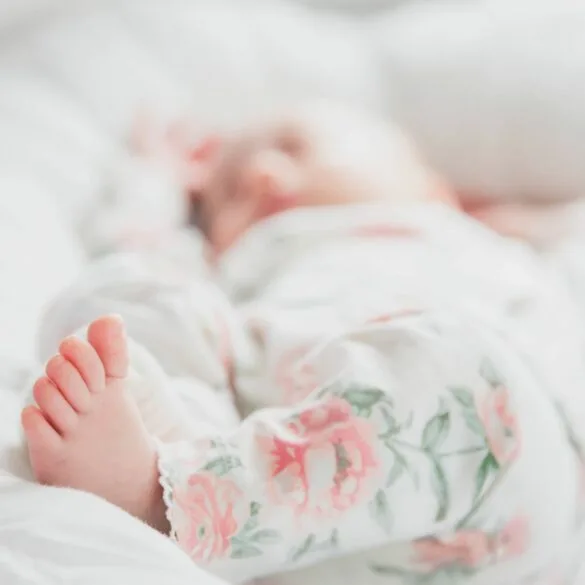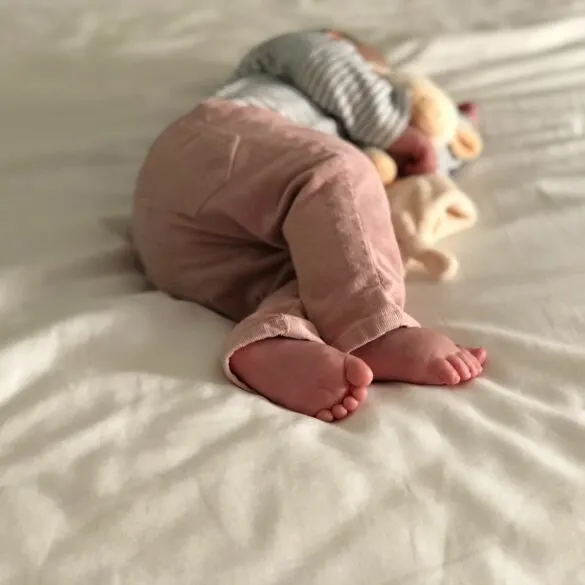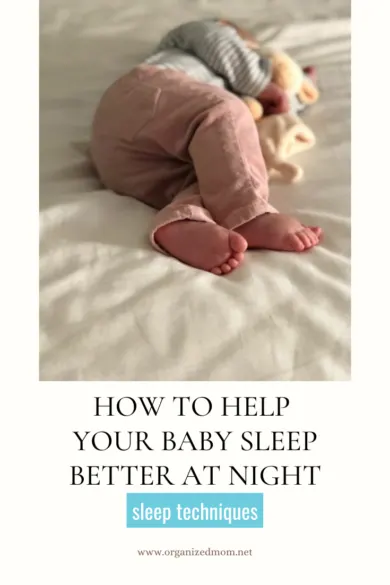Getting more sleep, and better quality sleep is usually at the top of every new parent’s priorities. In this article we’re going to discuss a few of the different philosophies of sleep techniques and on how to help your baby sleep better at night.
How to Help Your Baby Sleep Better At Night
Almost every topic related to babies and parenting is heavily debated and contested online. As a parent, it’s important that you decide what is right for you and your child. You may have different goals or want different outcomes for your family and that is perfectly ok!
It’s important to remember that a well rested baby is usually a happy baby. And a well rested momma is usually a happier momma.

Sleeping Goals
There are many different types of infant sleep techniques. But they each have two main goals.
The first goal is to have the baby fall asleep by themselves, without being dependent on parents to get the baby to sleep. No more pacifiers, or holding and rocking the baby for hours a night. The goal is to be able to just place the baby in their crib and they will fall asleep by themselves.
The second goal is to have the baby sleep through the night without waking up. No more 1:00 am cryings and night feedings. Just soundly sleeping through the night for 6-8 hours or more.
When to Start
It’s best to talk with your pediatrician about the right time and age to start “sleep training” your baby.
(Note: I understand that the phrase “sleep training” is synonymous with the “Cry It Out” method for many people. But it isn’t the same thing. You can sleep train your child without ever using the “Cry It Out” method.)
But most doctors agree that babies under the age of four months are too little to start sleep training. Newborn babies and babies under that age of four months often need to eat during the night. They are not yet big enough to manage getting all their calorie needs during the daytime.

Beware of Sleep Dependency
Many infants will become sleep dependent on certain things to fall asleep and stay asleep. Some common sleep dependencies include: having to be held, rocked, nursed, needing a bottle, or a pacifier.
These things work well when infants are young, like 3 months or younger. But when your child can’t fall asleep on their own and they need you to rock them back to sleep, even when they are 6 or 8 months old, it’s going to be very tiring.
Having a baby that can fall asleep on their own is going to save you a lot of time, energy and sleep.
Some sleep methods encourage the use of noise machines and “blacked out” rooms with light blocking curtains. These can be helpful in getting your baby to sleep through the night, but babies often become sleep dependent on those things as well.
Often, they won’t be able to sleep without their noise machine or if they’re outside of their dark room. This can make day trips and vacations very difficult or impossible. With this technique the baby is not sleep dependent on you getting them to sleep, but they are dependent on a very specific type of environment.
Help Your Baby Be A “Free Sleeper”
The biggest goal is to get your baby to be a “Free Sleeper”. This means your baby can fall asleep on their own, and that they are not dependent on a specific environment. Your child can sleep in their crib at home, or their stroller when out of the house. Your baby can be a sleep champ, without being dependent on outside forces.
Eating Habits Directly Impact Sleep Habits
It wasn’t until I was pregnant and read the book “The Secrets of the Baby Whisperer” by Tracy Hogg and Melinda Blau that I learned how much of a direct impact an infant’s eating has on their sleep.
But it actually makes a lot of sense; if a baby is hungry then they aren’t going to sleep well.
“The Secrets of the Baby Whisperer” talks about how important it is to have a regular eating and sleeping routine with your baby – even as a newborn.
The Baby Whisperers call their routine E.A.S.Y. This is an acronym that stands for Eat, Activity, Sleep, You Time. They suggest having your baby eat first thing when they wake up in the morning, then do an age appropriate activity (tummy time), then a nap. This routine will repeat every few hours.
If you want more of a visual look at what this “E.A.S.Y. Routine” looks like during the day, then check out Noob Mommy.com’s free PDF download.

Baby’s Tired Cues
As it’s nearing your baby’s naptime, you should be looking for cues that your child is tired. These include: staring into space, jerky arm and leg movements, fluttering eyelids, crossed eyes, yawing, frowning, and fussing.
These cues can also be similar cues for when your baby is experiencing digestional discomfort. So you’ll want to see if your baby needs help burping or passing gas.
If it’s been about two or three hours since they woke up, then your baby is probably tired and ready for a nap. Try laying them in their bed awake, but drowsy to see if they can drift off to sleep by themselves.
Bedtime Routines are Important
No matter which sleep method or technique you decide is right for you, almost all of them agree that a bedtime routine is important for a successful night’s sleep.
Just be sure that you can complete your bedtime routine while your baby’s stomach is still relatively full. It’s never a good idea to put a baby to bed when they are hungry.
Bedtime routines may include: putting your baby down for bed at a consistent time each night, bathtime, and dimming lights. Anything that cues to your baby that it’s time to sleep for the night.
I hope these tips help your baby sleep, and that you are both able to get the rest you need.
